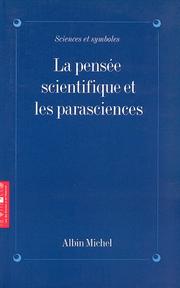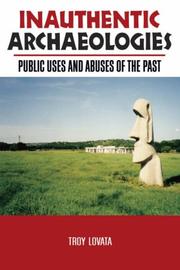| Listing 1 - 10 of 22 | << page >> |
Sort by
|
Book
ISBN: 9780190944421 0190944420 Year: 2023 Publisher: New York, NY : Oxford University Press,
Abstract | Keywords | Export | Availability | Bookmark
 Loading...
Loading...Choose an application
- Reference Manager
- EndNote
- RefWorks (Direct export to RefWorks)
"Pseudoscience: A Very Short Introduction explores the philosophical and historical attempts to address this problem of demarcation between science and pseudoscience. Many people would be able to agree on a list of things that fall under the umbrella of pseudoscience - astrology, phrenology, UFOlogy, creationism, and eugenics might come to mind - but a precise definition has proven impossible. This book explores a bewildering array of marginalized doctrines, focusing on some of the central debates about what science is and is not, and how such controversies have shifted over the centuries, and offers a historical and philosophical approach to fringe science and scientific controversies in the past and the present"--
Pseudoscience --- Pseudoscience. --- Parasciences.
Book
ISBN: 9780197555767 Year: 2021 Publisher: Oxford : Oxford University Press,
Abstract | Keywords | Export | Availability | Bookmark
 Loading...
Loading...Choose an application
- Reference Manager
- EndNote
- RefWorks (Direct export to RefWorks)
Everyone has heard of the term "pseudoscience", typically used to describe something that looks like science, but is somehow false, misleading, or unproven. Many would be able to agree on a list of things that fall under its umbrella - astrology, phrenology, UFOlogy, creationism, and eugenics might come to mind. But defining what makes these fields "pseudo" is a far more complex issue. It has proved impossible to come up with a simple criterion that enables us to differentiate pseudoscience from genuine science. Given the virulence of contemporary disputes over the denial of climate change and anti-vaccination movements - both of which display allegations of "pseudoscience" on all sides - there is a clear need to better understand issues of scientific demarcation. 'On the Fringe' explores the philosophical and historical attempts to address this problem of demarcation. This book argues that by understanding doctrines that are often seen as antithetical to science, we can learn a great deal about how science operated in the past and does today. This exploration raises several questions : How does a doctrine become demonized as pseudoscientific ? Who has the authority to make these pronouncements ? How is the status of science shaped by political or cultural contexts ? How does pseudoscience differ from scientific fraud ? Michael D. Gordin both answers these questions and guides readers along a bewildering array of marginalized doctrines, looking at parapsychology (ESP), Lysenkoism, scientific racism, and alchemy, among others, to better understand the struggle to define what science is and is not, and how the controversies have shifted over the centuries. 'On the Fringe' provides a historical tour through many of these fringe fields in order to provide tools to think deeply about scientific controversies both in the past and in our present.
Pseudoscience --- Parasciences --- History. --- Histoire. --- Histoire
Book
ISBN: 9780199561834 0199561834 Year: 2010 Publisher: Oxford : Oxford University Press,
Abstract | Keywords | Export | Availability | Bookmark
 Loading...
Loading...Choose an application
- Reference Manager
- EndNote
- RefWorks (Direct export to RefWorks)
Science --- Evidence. --- Pseudoscience. --- Fraud in science. --- Sciences --- Evidence --- Parasciences --- Fraude scientifique --- Philosophy. --- Philosophie

ISBN: 2226064648 9782226064646 Year: 1993 Publisher: Paris : Albin Michel,
Abstract | Keywords | Export | Availability | Bookmark
 Loading...
Loading...Choose an application
- Reference Manager
- EndNote
- RefWorks (Direct export to RefWorks)
Occultisme --- Irrationalisme (Philosophie) --- Sciences --- la pensée scientifique --- l'imaginaire --- parasciences --- médias --- superstition --- Colloque de la Villette
Book
Year: 2013 Publisher: Paris : Sophia Publications,
Abstract | Keywords | Export | Availability | Bookmark
 Loading...
Loading...Choose an application
- Reference Manager
- EndNote
- RefWorks (Direct export to RefWorks)
Debates and debating. --- Pseudoscience. --- Science --- Controverses scientifiques. --- Sciences --- Philosophie des sciences. --- Parasciences. --- History. --- Histoire.
Book
ISBN: 9781683674344 Year: 2023 Publisher: Hoboken, NJ : Wiley-ASM Press,
Abstract | Keywords | Export | Availability | Bookmark
 Loading...
Loading...Choose an application
- Reference Manager
- EndNote
- RefWorks (Direct export to RefWorks)
Penned by seasoned microbiologists Ferric C. Fang and Arturo Casadevall, this book offers a comprehensive analysis of the scientific enterprise through various lenses, including historical, philosophical, and personal. From their unique vantage points as researchers, clinicians, and educators, Fang and Casadevall dissect the intricate mechanisms of science, shedding light on its strengths and weaknesses. Through engaging historical anecdotes, personal narratives, and insightful academic studies, they present a candid evaluation of science's performance, including a thought-provoking examination of its role during the COVID-19 pandemic. A must-read for anyone curious about the present predicaments and future potential of science, Thinking about Science: Good Science, Bad Science, and How to Make It Better is more than just a book; it's a roadmap to understanding and improving the scientific endeavor for the benefit of society at large.
Science --- Science --- Science --- Pseudoscience. --- Philosophie des sciences. --- Sciences et société. --- Sociologie des sciences. --- Parasciences. --- Controverses scientifiques. --- Social aspects. --- Methodology. --- Philosophy.
Book
ISBN: 9791031904009 Year: 2023 Publisher: Paris Éditions de L'Herne
Abstract | Keywords | Export | Availability | Bookmark
 Loading...
Loading...Choose an application
- Reference Manager
- EndNote
- RefWorks (Direct export to RefWorks)
L'étude des rapports entre sciences humaines, ésotérisme et occultisme irrigue intrinsèquement toutes les disciplines des sciences humaines. Si les historiens, anthropologues et ethnologues ont de longue date investi ces domaines de la culture occidentale, les spécialistes de littérature ont tendance à regarder ces objets avec suspicion, même si ces derniers font intrinsèquement partie de la pensée des auteurs ou de leur bagage culturel. L'ambition de ce Cahier est donc de parcourir cette création littéraire, depuis la fin du XVIIIe siècle jusqu'à l''émergence du concept de contre-culture à la fin des années 50. Pour envisager une telle perspective diachronique, l'approche littéraire est indissociable d'une histoire culturelle et des mentalités. C'est pourquoi le cahier « Mondes invisibles » a été conçu comme le lieu d'un dialogue interdisciplinaire et transéculaire. Organisé en quatre volets, le Cahier aborde autant de thématiques telles que le spiritisme et les formes occultes et ésotériques qu'il revêt, au XIXe siècle, la tension dialectique entre sciences et para-sciences, les héritages ésotériques, les individualités remarquables du mouvement, ou encore les phénomènes collectifs qui ont alluvionné la création littéraire. Ce volume explore les enjeux intellectuels et culturels des mondes invisibles dans une perspective historique, littéraire et anthropologique. Il réunit une cinquantaine de contributions de spécialistes, de nombreux textes rares, dont une traduction d'un inédit de Conan Doyle, ainsi qu'une vingtaine d'illustrations.
Pseudoscience --- Occultism --- Occultism in literature. --- Supernatural. --- Supernatural in literature. --- Magic in literature. --- Parasciences. --- Ésotérisme. --- Alchimie. --- Symbolisme (mouvement littéraire) --- Spiritualité. --- Esoteric sciences --- Thematology

ISBN: 9781598740110 9781598740103 1598740113 1598740105 Year: 2007 Publisher: Walnut Creek, Calif. : Left Coast Press,
Abstract | Keywords | Export | Availability | Bookmark
 Loading...
Loading...Choose an application
- Reference Manager
- EndNote
- RefWorks (Direct export to RefWorks)
Archaeology --- Authenticity (Philosophy) --- Forgery. --- Pseudoscience. --- Archaeology --- Archéologie --- Authenticité (Philosophie) --- Faux --- Parasciences --- Archéologie --- Moral and ethical aspects. --- Philosophy. --- Aspects éthiques et moraux --- Philosophie
Book
ISBN: 9782862538952 Year: 2021 Publisher: Bonneton
Abstract | Keywords | Export | Availability | Bookmark
 Loading...
Loading...Choose an application
- Reference Manager
- EndNote
- RefWorks (Direct export to RefWorks)
Franz Anton Mesmer (1734-1815) --- magnétiseurs --- magnétisme --- médecine alternative --- enquêtes --- guérisseurs --- médecines complémentaires alternatives (MCA) --- médecine intégrée --- placebo --- science --- parasciences --- ésotérisme --- thérapie --- Reiki (霊気) --- mesmérisme --- histoire du magnétisme
Book
ISBN: 9782379310003 2379310009 Year: 2019 Publisher: Paris : HumenSciences,
Abstract | Keywords | Export | Availability | Bookmark
 Loading...
Loading...Choose an application
- Reference Manager
- EndNote
- RefWorks (Direct export to RefWorks)
Savez-vous ce qu'est la Zététique ? L'art du doute nourri par la méthode scientifique. Le refus de toute affirmation dogmatique, mais aussi une autodéfense contre les idées reçues, les fausses évidences, les illusions sensorielles, les raisonnements erronés... tous ces pièges que nous tend notre cerveau. L'intelligence n'immunise pas contre l'erreur. Quand nos neurones sont biaisés nous n'avons aucun moyen objectif de le savoir. Alors il faut apprendre à douter. Une méthode mise en scène avec humour dans des dialogues entre la marionnette Mendax, incarnation de notre cerveau avide de réponses simples et définitives, et Vled Tapas, professeur d'esprit critique. Un livre de salubrité critique !
Science --- Judgment --- Sciences --- Scepticisme. --- Vérité. --- Parasciences --- Parapsychologie et sciences. --- Manipulation (psychologie) --- Infox. --- Esprit critique. --- Méthodologie. --- Philosophy --- Methodology --- Philosophie. --- Études de cas. --- Critical thinking. --- Pseudoscience. --- Fake news. --- Truth. --- Errors, Scientific. --- Skepticism. --- Manipulative behavior. --- Parasciences. --- Vérité. --- Erreurs scientifiques. --- Methodology. --- Méthodologie.
| Listing 1 - 10 of 22 | << page >> |
Sort by
|

 Search
Search Feedback
Feedback About UniCat
About UniCat  Help
Help News
News